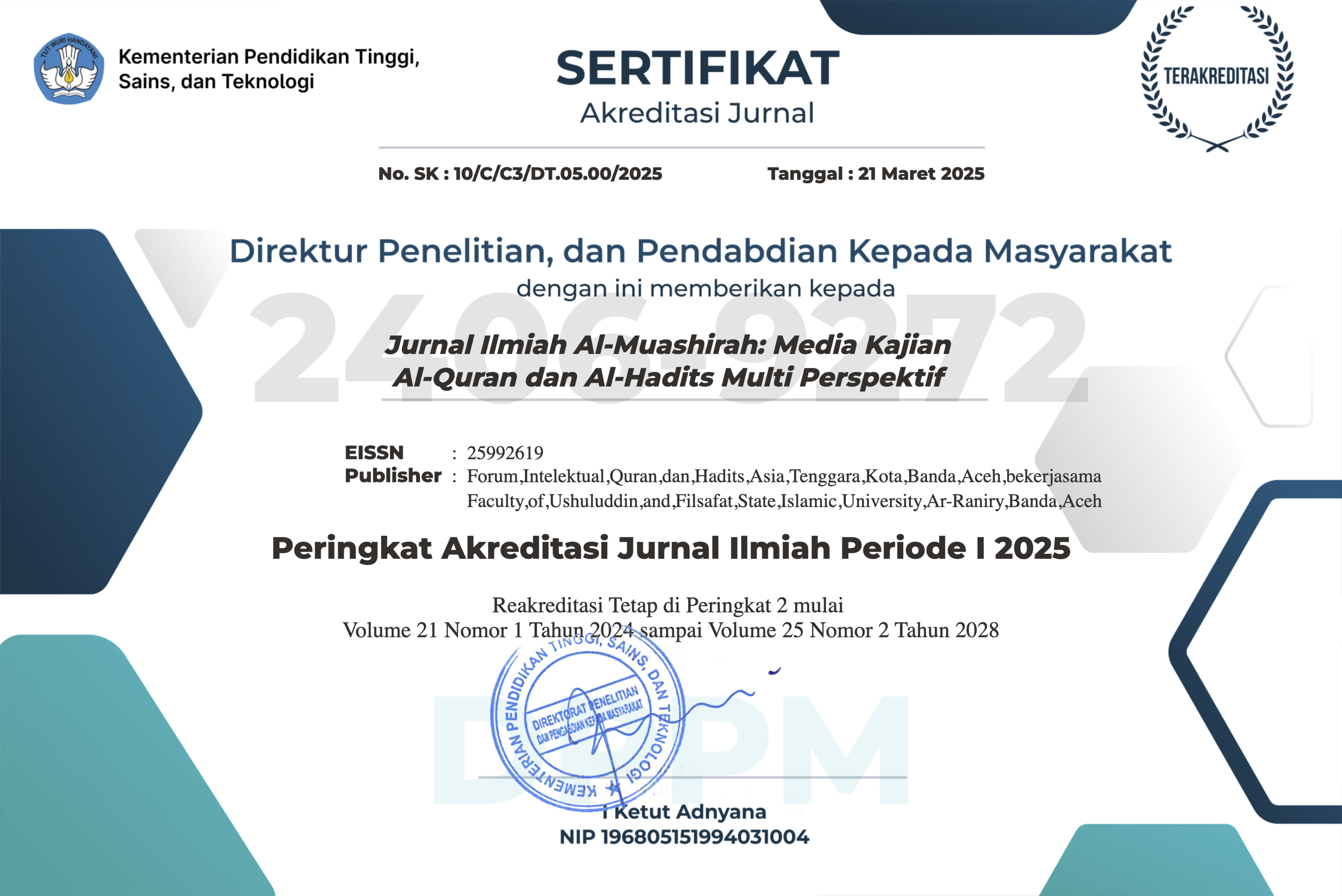Humour in Islam: A Philosophy Study of Humour
DOI:
https://doi.org/10.22373/jim.v20i1.16848Keywords:
Hadith, Humour, PhilosophyAbstract
Hadith is the second source of Islamic law after the Quran. Hadith was sourced from an interpretation of the practices of the deeds, words, and actions of Rasulullah SAW, as well as the application of Islamic teachings that are carried out in a factual and ideal manner. Muslims are expected to follow, apply, and practice it in their daily lives. Life needs humour; even humour and laughter are human nature that God has destined for humans. Humour is permissible in Islam; many texts of the Qur'an and Hadith allow it, and even the Prophet himself often joked and laughed with his companions. There are several reasons that the Messenger of Allah allowed reasonable humour, among them: being within limits and natural, not having lies, not insulting or slighting fellow Muslims, being far from fear and threats, knowing and being fit for the situation and conditions, and being within acceptable limits of common sense.
Downloads
References
Al-Bukhari, Sahih, ‘Sahih Al-Bukhari 4811 - Prophetic Commentary on the Qur’an (Tafseer of the Prophet (Pbuh)) - كتاب التفسير - Sunnah.Com - Sayings and Teachings of Prophet Muhammad (صلى الله عليه و سلم)’ <https://sunnah.com/bukhari:4811> [accessed 27 December 2022]
Al-Mubarakfuri, Abdurrahman, Tuhfatul Ahwadzi Syarah Jami’ Al-Tirmidzi, 1st edn (Riyadh: Bayt al-Afkar al-Dauliyyah)
Al-Qaradhawi, Yusuf, Islam Bicara Seni (Solo: Era Adicitra Intermedia, 2019)
Al-Syarwi, Qutub Izzinddin Jamil, Fikih Humor (Pati: Perpustakaan Mutamakkin Press, 2016)
An-Najr, Zaghlul, Sains Dalam Hadis Mengungkapkan Fakta Ilmiah Dari Kemukjizatan Hadis Nabi (Jakarta: Amzah, 2011)
Bisri, Ahmad Mustafa, Fikih Keseharian Gus Mus (Surabaya: Khalista, 2006)
Fadil, Muhammad, ‘Filsafat Humor’, 2022 <https://www.zonanalar.com/artikel/filsafat/filsafat-humor/> [accessed 26 December 2022]
Faiz, Fahruddin, Menjadi Manusia Menjadi Hamba (Jakarta: Noura Books, 2022)
Fikri, Hamdani Khairul, ‘FUNGSI HADITS TERHADAP AL-QUR`AN’, TASÂMUH, 12.2 SE-Articles (2015), 178–88 <https://journal.uinmataram.ac.id/index.php/tasamuh/article/view/181>
Firdaus, Muhamad Yoga, and Wahyudin Darmalaksana, ‘Diskursus Humor Dan Etika Dalam Perspektif Al-Qur’an’, MAGHZA: Jurnal Ilmu Al-Qur’an Dan Tafsir, 6.1 (2021), 63–76 <https://doi.org/10.24090/maghza.v6i1.4419>
Heatubun, Fabianus, ‘Humor Dan Homo Ridens’, Extension Course Filsafat ( ECF ), 2, 2014 <https://doi.org/10.26593/ECF.V0I2.2004>
Hendarto, Priyo, Filsafat Humor (Jakarta: Karya Megah, 1990)
Jami` at-Tirmidhi 2315, ‘Chapters On Zuhd - كتاب الزهد عن رسول الله صلى الله عليه وسلم - Sunnah.Com - Sayings and Teachings of Prophet Muhammad (صلى الله عليه و سلم)’ <https://sunnah.com/tirmidhi:2315> [accessed 27 November 2022]
Manser, Juan, Dictionary of Humor (Los Angeles: Diego and Blanco Publisher Inc, 1898)
Rahmanadji, Didiek, ‘Sejarah, Teori, Jenis, Dan Fungsi Humor’, Jurnal Bahasa Dan Seni, 35.2 (2007), 213–21
Sahih Muslim 2564a, ‘The Book of Virtue, Enjoining Good Manners, and Joining of the Ties of Kinship - كتاب البر والصلة والآداب - Sunnah.Com - Sayings and Teachings of Prophet Muhammad (صلى الله عليه و سلم)’ <https://sunnah.com/muslim:2564a> [accessed 27 January 2023]
Sunan Abi Dawud 4990, ‘General Behavior (Kitab Al-Adab) - كتاب الأدب - Sunnah.Com - Sayings and Teachings of Prophet Muhammad (صلى الله عليه و سلم)’ <https://sunnah.com/abudawud:4990> [accessed 27 November 2022]
Sunan Abi Dawud 5004, ‘General Behavior (Kitab Al-Adab) - كتاب الأدب - Sunnah.Com - Sayings and Teachings of Prophet Muhammad (صلى الله عليه و سلم)’ <https://sunnah.com/abudawud:5004> [accessed 27 January 2023]
Sunan Ibn Majah 4193, ‘Sunan Ibn Majah 4193 - Zuhd - كتاب الزهد - Sunnah.Com - Sayings and Teachings of Prophet Muhammad (صلى الله عليه و سلم)’ <https://sunnah.com/ibnmajah:4193> [accessed 27 January 2023]
Wahid, Ramli Abdul, Sejarah Pengkajian Hadis Di Indonesia (Medan: IAIN Press, 2010)
Zakaria, Dedi, and Hidayati, ‘Kajian Tematik Tentang Hadis-Hadis Tertawa’, Dirayah: Jurnal Syudi Ilmu Hadits, 2.1 (2021), 77–100 <https://e-jurnal.stiqarrahman.ac.id/index.php/dirayah/article/view/56> [accessed 26 January 2023]
Downloads
Published
Issue
Section
License
Authors who publish in Jurnal Ilmiah Al-Mu'ashirah agree to the following terms:
- Authors retain copyright and grant the journal right of first publication with the work simultaneously licensed under a Attribution-ShareAlike 4.0 International (CC BY-SA 4.0) License that allows others to share the work with an acknowledgment of the work's authorship and initial publication in this journal.
- Authors are able to enter into separate, additional contractual arrangements for the non-exclusive distribution of the journal's published version of the work (e.g., post it to an institutional repository or publish it in a book), with an acknowledgment of its initial publication in this journal.
- Authors are permitted and encouraged to post their work online (e.g., in institutional repositories or on their website) prior to and during the submission process, as it can lead to productive exchanges, as well as earlier and greater citation of published work (See The Effect of Open Access).













